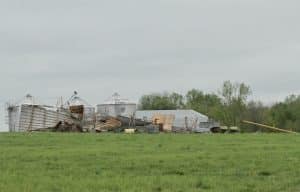River traffic still flowing, for now
Area rain and snow over the past weekend have brought a temporary reprieve for barge shippers on the middle Mississippi River.
Combined with recently completed rock removal work by the Army Corps of Engineers near Thebes, this has helped relax U.S. Coast Guard restrictions calling for smaller barge tows and shallower drafts.
The river gage at St. Louis registered a reading of -2.4 feet Monday morning and is rising. According to National Weather Service meteorologist Ben Miller, the weekend’s precipitation could bring the Mississippi up substantially this week. But he cautioned that north of St. Louis, there was less precipitation.
“Many places up there reported .1 or .2 inches of rain. We also had pretty good snow pack in Iowa, but the warm stretch last week melted much of it,” he said. “The ground was not frozen hard there, so it soaked in rather than running off.”
While that bodes well for spring crops, it offered little relief to river elevations.
Corps of Engineers contractors completed the most pressing rock pinnacles removal south of St. Louis last week. Some 365 tons of rock were removed in the most critical stretches.
According to Bob Anderson, Corps Mississippi Valley Division spokesman, “That should permit navigation to continue safely down to a St. Louis gage reading as low as -5.0 feet.”
Anderson also said dredging to prevent shoaling of the river bottom from the St. Louis region to the Ohio River is also continuing 24 hours a day.
While much of needed agricultural commodity shipments have already moved south, prospects for other commodities, such as salt for roads, fertilizer, aggregate and cement and other bulk items moved by barges, remain under threat.
The Coast Guard has relaxed cuts to barge tow sizes and drafts this week. But the navigation industry remains on notice that, barring more rain, restrictions could again become necessary.
Ed Henleben, who heads the Ingram Barge Company office in East Carondelet, pointed out that the barge industry is very resilient.
“We’ve been through record floods and low water episodes before,” he said. “We’ll weather this, too.”
Concerning Ingram in particular, Henleben said “We are not profitable as things stand now, but we have met and will continue to meet our contract commitments.”
Henleben highlighted a little known regional impact.
“The Holcim cement plant across the river near St. Genevieve, Mo., is today, the largest producer of that critical construction material in the world – not the Midwest or nation – the world,” he emphasized. “And almost all of that product moves by barge.”
And it’s not just barges in danger.
“If we have to, we can continue to load them lighter and shallower. But there are tighter limits to how much we can reduce draft on the big tow boats that push them,” he said.
Henleben complimented the Corps, which has been criticized by many.
“We had low water like this in 1988. Everything stopped then,” he said. “But between the river engineering structures and other channel maintenance they have performed, we have not been stopped once this year. They have made the river much more efficient and safer than it was 25 years ago.”






